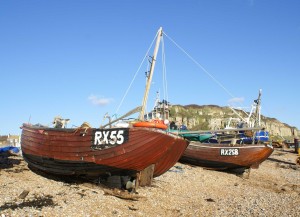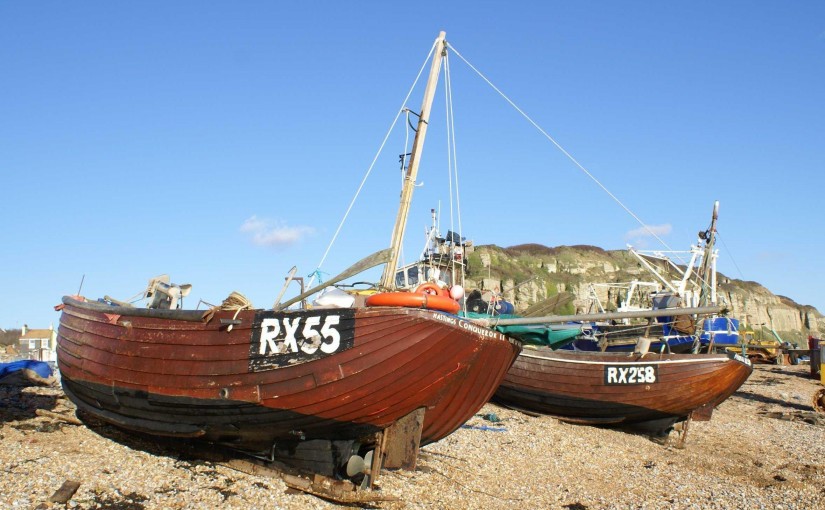by Vivien Delaharpe
I came home recently, to the land of my birth, to visit my son and his family. And I looked back, to the time when I was a schoolgirl in Hastings.
A nice little town, always full of holiday-makers and day-trippers, who were getting the sea air and eating plates of fresh seafood from the street stalls along the old part of town.
The Old Town was the hub of Hastings. There was the roller rink, the Penny Arcade, and the hot pie shop at the other end. On our way to the pictures at the De Luxe we’d get a hot pie for sixpence to eat while waiting to pay our shilling to get a seat. Or we’d go looking in the small shops where you could buy anything from a clay bubble pipe to a rubber ring to swim with, for a penny.

I remember the parade of the Winkle Club and the Pearly King and Queen. It seemed as if the whole town, grown-ups and us children, danced around Winkle Island. Even the local policeman joined in. Everyone knew everyone else.
There was a Winkle Club Christmas party for all the children. Our parents paid a shilling for the ticket, no matter how many children in the family. All the money went to help with the upkeep of Hastings Lifeboat. Sometimes it was called out two or three times in as many weeks, and the whole town and outlying areas for miles around always heard the SOS rockets.
One name always comes to mind – Biddy Stonham or Biddy the Tub as we children called him. He was getting on in years, but he was said to have single-handedly saved many seamen and women who, but for him, would have been lost at sea. During World War II he was one of many fishermen who helped take our men off the Normandy beaches. It was said he told his wife, ‘I’m just taking the boat out, but I’ll be back for tea.’ He made four trips that day, leaving many other brave men at the bottom of the sea. I was told this story by my maternal grandmother; her father lost most of his fishing fleet that day.
My gran’s brother, Nelson Winborn, owned the sweetshop across from Sandown Road. By four o’clock it was always full of children going home from Sandown school.
I was born in High Bank, Ore, and weighed only 2lb 1oz. I’m told that I was put in a shoe box and placed in the gentle warming oven of the huge cast iron stove, where the plates usually went. The stove, which was usually heated with wood or coke, went along almost the whole kitchen wall.
When I was older we were bombed out and relocated to 113 Bembrook Road. Here we had a view of the East Hill and the gun placements overlooking the Channel to France.
In those days the rentman called on a Friday. One day that poor man was knocked off his feet when German bombers came over and my mother and grandmother rushed out to grab my brother, who had been put out in his pram, pulling me behind as we made for the coal cellar.
Nothing stopped in those days. Milk and bread were delivered on Monday, Wednesday and Saturday even if the bombers were overhead – the milkman and bakery boy just went into the nearest bunker until the all-clear sounded, then carried on as normal.
Sometimes German planes were shot down as they came over the coastline on their way to London, and now and then German airmen were found sitting in the old graveyard at the back of our house, waiting for the Home Guard to pick them up.
One German plane often came over at mid-day, but he always dropped his bomb-load in the Channel. It got so we’d look out for him and he’d come in low and we’d wave to him. One day he didn’t come any more and I often wondered what happened to him and hoped he made it back to his family,
Then the V-bombs came and we’d wait to hear the whistling sound stop and, when it did, you just hoped it didn’t hit you or someone you knew.
One day a bomb hit at the bottom of our road. Old Mrs Breade had just got up when all her windows blew in, leaving glass and bits of metal all over her bed. A large piece of metal lay on her pillow where, not five minutes before, her head had been.
I can still hear her shouting, ‘You’ll have to do better than that to keep us down! Now I’ve got a mess to clean up before my man gets in to eat!’
Mr Breade was a night warden. He’d lost an arm in World War I, but that never stopped him doing his bit towards the war effort, as he used to say, ‘for King and country.’
Later we’d all be playing outside watching the clean-up by men and women looking to see if anything could be saved from the homes hit by the blast. When VE day was announced, grown-ups all over England held street parties for the children. The shopkeepers gave cakes, bread, butter, meat paste and lots of fruit, while the ice-cream man gave us all free ice-cream.
After the war, many did not have bathrooms so they’d go to the White Rock Public Baths where, for sixpence, you’d get a small towel, a piece of soap and use of the bathrooms.
To get food and clothes we had coupon books. I remember my mother taking me to get a pair of white socks, which cost ninepence plus one clothing coupon. Weekly shopping for food was no different. Each child was allowed 2oz cheese, 2½oz margarine, three rashers of bacon, dry powdered eggs from Canada or the USA and one small bottle of milk. You also got a free bottle of milk a day at school.
No-one complained about not having things, or sweets. We were happy to have our mums and grans, as many of the children lost both. I was lucky because I still had my mother and grandparents, but when I was younger we’d lost my father to the war.
But it taught us to look out for each other, keep working hard at school and to think of others not so well off as us.
‘Looking’ Back is from ‘Diamonds – A Collection of Childhood Memories’, a charity anthology compiled by Hastings Writers’ Group to celebrate their Diamond Anniversary last year. Diamonds supports Demelza House Children’s Hospice, RNIB Talking Books and Xpress Yourself magazine for children in care. Available at £6.50 from Hastings Tourist Information, Conquest Hospital shop, or by post from HWG, 39 Emmanuel Road, Hastings TN34 3LB (cheques payable to Hastings Writers Group – Diamonds A/c and optional £1 towards postage appreciated).
Hastings Town March 2008
All articles, photographs and drawings on this web site are World Copyright Protected. No reproduction for publication without prior arrangement. © World Copyright 2015 Cinque Ports Magazines Rye Ltd., Guinea Hall Lodge Sellindge TN25 6EG
